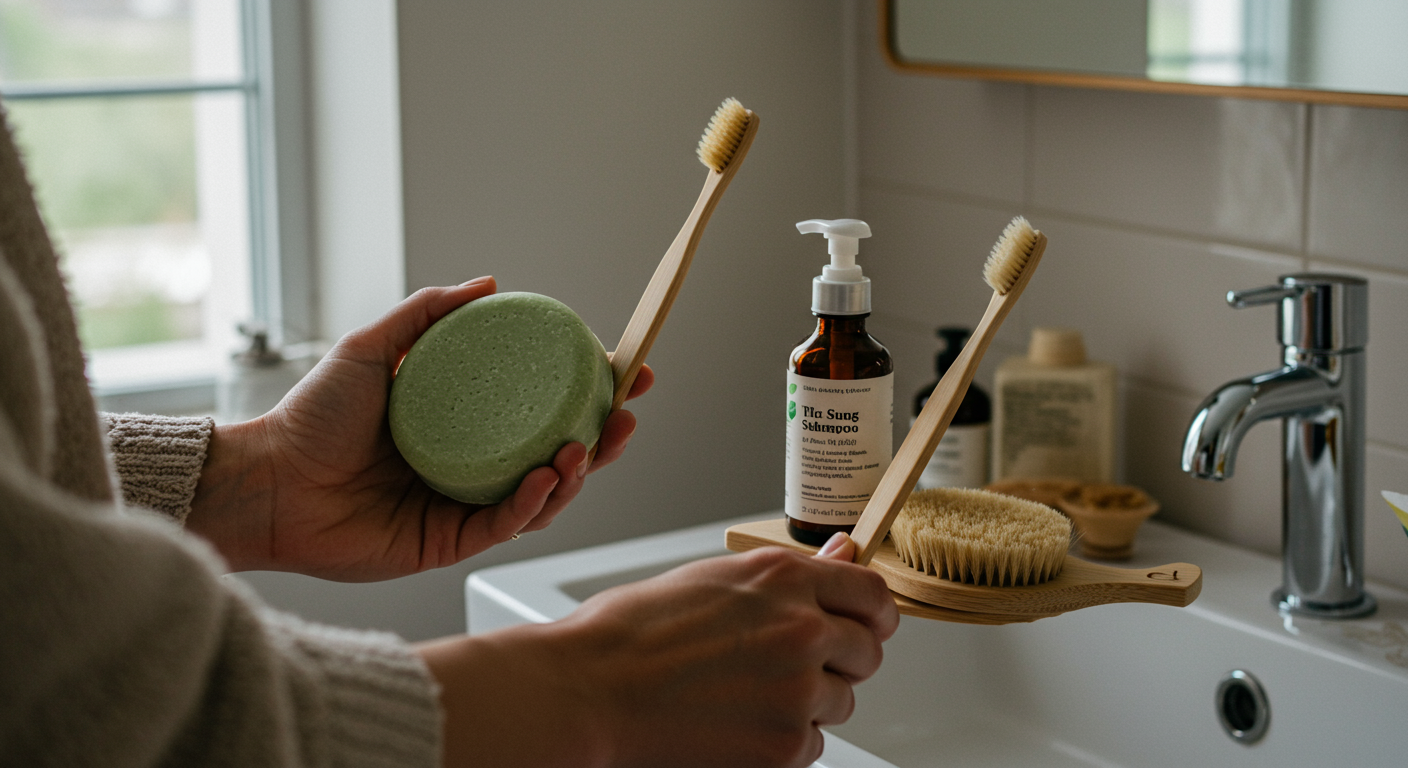Your bathroom, often a hidden source of plastic waste and environmental impact, can be transformed into a sanctuary of sustainability. This guide is designed for the eco-conscious consumer, providing actionable swaps and insights to minimize your footprint. By choosing eco-friendly products and adopting new habits, you can create a bathroom that's both healthy for you and the planet.

Deep Dive into Eco-Friendly Bathroom for Eco-Conscious Living
The modern bathroom is laden with plastic, from shampoo bottles to cleaning sprays. This section looks beyond the basics and explores advanced strategies for a truly sustainable bathroom. We'll delve into innovative product choices, DIY solutions, and waste-reduction techniques.
Advanced Strategies and Insights
- Shampoo & Conditioner Bars: Ditch the plastic bottles! Shampoo Bars are a fantastic zero-waste alternative, offering concentrated formulas that last longer and often come in biodegradable packaging. Look for brands that prioritize natural ingredients and ethical sourcing.
- Bamboo Toothbrushes & Biodegradable Floss: Plastic toothbrushes are a major source of waste. Bamboo toothbrushes, like those from Brush with Bamboo, are a sustainable alternative. Pair them with biodegradable floss made from silk or cornstarch for a complete zero-waste oral hygiene routine.
- Reusable Cotton Rounds & Washcloths: Replace disposable cotton pads with reusable cotton rounds. These can be easily washed and reused. Use washable washcloths instead of paper towels to dry hands. This simple swap can greatly reduce your paper waste.
- DIY Cleaning Solutions: Commercial bathroom cleaners often contain harsh chemicals and come in plastic bottles. Make your own eco-friendly cleaning solutions using vinegar, baking soda, and essential oils. This not only reduces waste but also ensures a healthier home environment.
- Low-Flow Showerheads & Faucets: Conserve water by installing low-flow showerheads and faucet aerators. These devices reduce water consumption without sacrificing water pressure.
- Composting Toiletries: Consider composting certain toiletries. Some compostable options include bamboo cotton swabs, hair, and nail clippings.
Optimizing Your Sustainable Bathroom
- Review Product Certifications: Look for certifications like the USDA Certified Biobased Product label, which indicates a product is made from renewable biological sources. Look for the Leaping Bunny logo to ensure products are cruelty-free.
- Consider Refillable Options: Choose refillable options for hand soap, body wash, and other frequently used products to reduce plastic consumption.
- Research Packaging Materials: When purchasing products, research the packaging material. Choose products with minimal packaging or packaging made from recycled materials, or compostable options.
Navigating Complex Environmental Challenges
This section addresses the challenges of finding truly sustainable products and offers insights for conscious consumers:
- Greenwashing Awareness: Be aware of greenwashing. Don't be fooled by misleading marketing claims. Look for certifications and transparent labeling.
- Evaluating Ingredient Lists: Learn to read and understand ingredient lists. Avoid products containing harmful chemicals like parabens, phthalates, and synthetic fragrances.
- Supporting Sustainable Brands: Prioritize brands that are committed to sustainability and transparency. Look for companies that offer eco-friendly packaging, ethical sourcing, and carbon-neutral shipping.
Integrating Advanced Sustainable Practices
- Bathroom Design: Consider sustainable materials for bathroom renovations, such as reclaimed wood, recycled tiles, and low-VOC paints.
- Energy Efficiency: Install LED lighting and consider energy-efficient appliances like water heaters and ventilation fans.
- Waste Reduction: Set up a recycling system for paper, plastic, and other materials, and explore options for composting food scraps and other organic waste.
Scaling Your Impact: Beyond Personal Choices
- Advocate for Change: Share your knowledge and experiences with others and advocate for sustainable practices in your community.
- Support Sustainable Businesses: Shop at local businesses that prioritize sustainability. Choose companies with a strong environmental and social commitment.
- Educate Yourself: Stay informed about sustainability issues and advancements by reading books, articles, and attending workshops.
Expert-Level Green Living Insights
- Water Conservation: Collect rainwater to use for gardening or flushing toilets to reduce water usage further. Fix leaky faucets promptly.
- Energy Efficiency: Use smart home technology to optimize energy use in your bathroom. Install a smart thermostat and motion sensors for lights.
- Material Matters: Choose durable, long-lasting products made from sustainable materials, such as natural stone, wood, or recycled materials. Select items that can be easily recycled or composted at the end of their life.